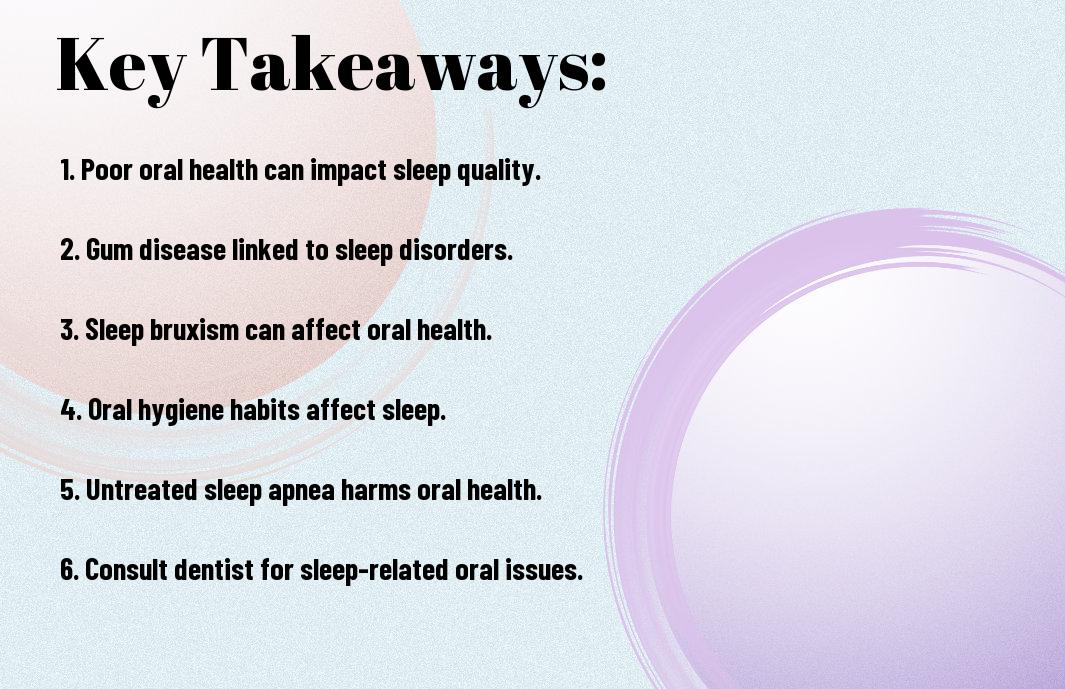Overlooked yet crucial, the link between oral health and sleep quality plays a significant role in our overall well-being. Recent studies have shown a strong correlation between poor oral health and disruptions in sleep patterns, leading to potential health risks that should not be ignored. Exploring the link between sleep quality and oral health can provide valuable insights into maintaining a healthy lifestyle.
Key Takeaways:
- Oral Health Impacts Sleep Quality: Poor oral health can lead to sleep disturbances and conditions such as sleep apnea, as issues like inflammation and bacteria in the mouth can affect breathing during sleep.
- Regular Dental Visits are Vital: Seeing a dentist regularly is crucial not only for oral health but also for maintaining good sleep quality, as they can detect and treat problems early on that may impact your sleep.
- Proper Oral Hygiene Habits Matter: Consistent brushing, flossing, and using mouthwash can help prevent oral health issues that may disrupt your sleep, emphasizing the importance of a solid oral hygiene routine.
The Bidirectional Relationship Between Oral Health and Sleep
How Oral Health Impacts Sleep
While it may not be immediately apparent, the state of your oral health can have a significant impact on the quality of your sleep. Poor oral health, such as gum disease or tooth decay, can lead to pain and discomfort that make it difficult to fall asleep or stay asleep throughout the night. Additionally, issues like acid reflux caused by poor oral health can further disrupt your sleep patterns.
How Sleep Affects Oral Health
With a good night’s sleep being crucial for overall well-being, it’s no surprise that sleep can also affect your oral health. Lack of quality sleep can weaken your immune system, making you more susceptible to oral infections like gum disease. Additionally, snoring, often associated with poor sleep quality, can contribute to dry mouth, leading to an increased risk of tooth decay.
Understanding the bidirectional relationship between oral health and sleep is crucial for maintaining overall health and well-being. Paying attention to both aspects and seeking professional help when needed can help you achieve better sleep and improved oral health in the long run.
Common Oral Health Issues and Their Impact on Sleep
Periodontal Disease and Sleep Disturbance
After a long day, the last thing you need is your sleep quality being compromised by periodontal disease. Common oral health issues like gum disease can lead to inflammation and infection of the gums, causing discomfort and pain that can disrupt your sleep. Research has shown a link between periodontal disease and sleep disturbances, as the body’s response to inflammation can trigger sleep disorders.
Temporomandibular Joint Disorders and Sleep Bruxism
Health professionals often see a connection between temporomandibular joint disorders (TMD) and sleep bruxism. Health issues related to the jaw joint and facial muscles can result in teeth grinding and clenching during sleep, known as bruxism. This not only causes dental problems but also disrupts sleep patterns, leading to fatigue and daytime drowsiness.
It’s important to address temporomandibular joint disorders and sleep bruxism to prevent further damage to oral health and improve sleep quality. Seeking professional help to diagnose and manage these conditions can prevent complications such as jaw pain, headaches, and long-term tooth damage. Implementing relaxation techniques, using a mouthguard at night, or undergoing therapy can effectively manage TMD and bruxism for a restful night’s sleep.
Improving Sleep Quality through Oral Health Care
Oral Hygiene Practices for Better Sleep
For optimal sleep quality, maintaining good oral hygiene practices is necessary. Brushing your teeth twice a day, flossing regularly, and using an antimicrobial mouthwash can help prevent the buildup of harmful bacteria in your mouth that can lead to various oral health issues, including gum disease and tooth decay. By keeping your mouth clean, you can reduce the risk of breathing problems that may disrupt your sleep.
Dental Interventions That Promote Healthy Sleep Patterns
For individuals struggling with sleep disorders like sleep apnea, dental interventions can play a crucial role in promoting healthy sleep patterns. Dental devices such as mandibular advancement devices (MADs) or tongue retaining devices can help keep your airway open during sleep, reducing the frequency of breathing pauses and improving overall sleep quality. These devices are custom-fitted by a dentist to ensure maximum effectiveness and comfort.
A mandibular advancement device (MAD) is a popular choice for treating sleep apnea. It works by repositioning the lower jaw slightly forward, which can help prevent the airway from collapsing during sleep. This can significantly reduce snoring and improve breathing while sleeping, leading to a more restful night’s sleep. If you suspect that you may have sleep apnea, consult with your dentist to see if a MAD or other dental intervention may be suitable for you.
Research and Future Directions
Recent Studies on Oral Health and Sleep Quality
Future research in the field of oral health and sleep quality has been progressing rapidly in recent years. Numerous studies have shown a strong correlation between poor oral health, such as gum disease and obstructive sleep apnea. These connections emphasize the importance of maintaining good oral hygiene practices for overall sleep quality.
Potential Areas for Future Research
One area of future research that shows promise is the investigation of the microbiome in the mouth and its influence on sleep quality. Recent studies have found a potential link between the oral microbiome and sleep disturbances. Understanding how the bacteria in our mouths affect our sleep patterns could lead to innovative therapies for improving overall sleep quality.
Summing up
Understanding the Connection Between Oral Health and Sleep Quality is crucial for overall well-being. Poor oral health can impact sleep quality and vice versa, creating a vicious cycle that can lead to various health issues. By prioritizing good oral hygiene practices and seeking dental care when needed, individuals can improve their sleep quality and overall health. Do not forget, a healthy mouth leads to a good night’s sleep!
FAQ
Q: What is the connection between oral health and sleep quality?
A: Poor oral health, such as gum disease and tooth decay, can lead to sleep problems like snoring and sleep apnea. Inflammation in the mouth can contribute to inflammation in the upper airway, which can obstruct breathing during sleep and result in poor sleep quality.
Q: How can oral health impact sleep patterns?
A: Oral health issues like tooth pain or untreated cavities can cause discomfort that affects the ability to fall asleep or stay asleep. Additionally, bacteria from gum disease can travel to the lungs and cause infections, leading to breathing difficulties during sleep.
Q: What can be done to improve both oral health and sleep quality?
A: Maintaining good oral hygiene practices such as brushing twice a day, flossing, and regular dental check-ups can help prevent oral health problems that can impact sleep. In cases of severe conditions like sleep apnea, a dentist or doctor may recommend treatments like oral appliances or CPAP machines to improve both oral health and sleep quality.







